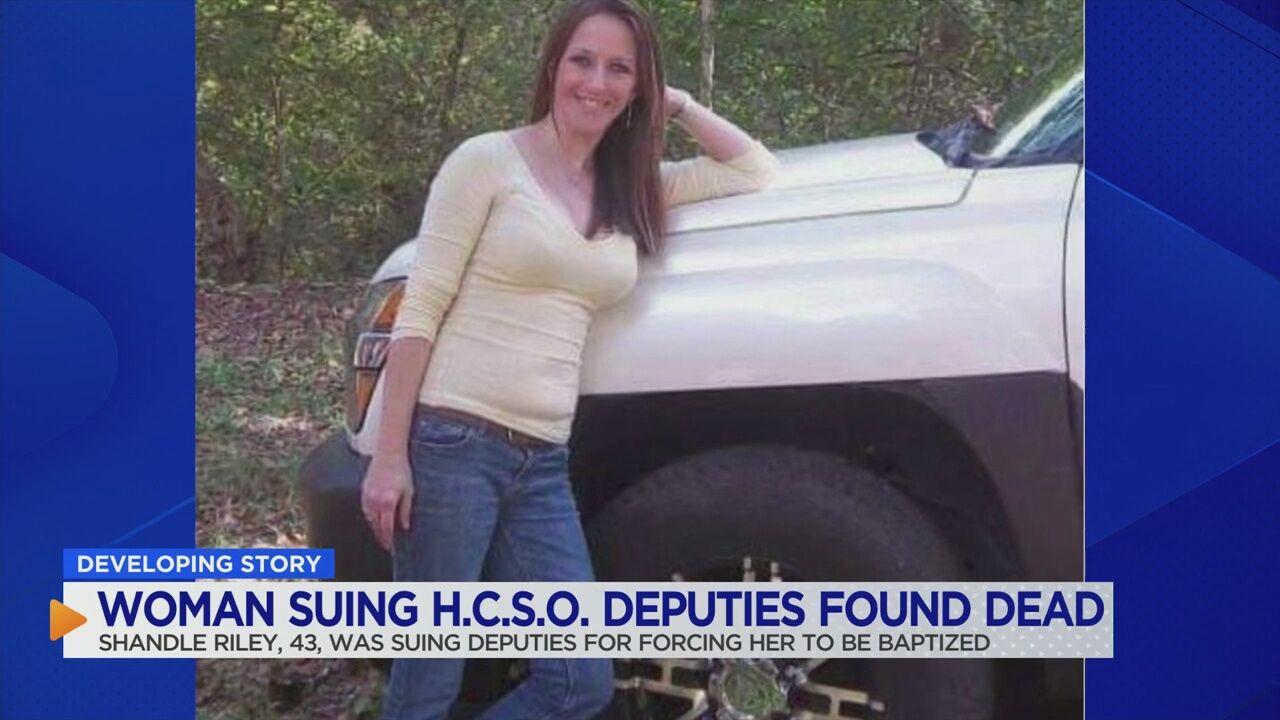Riley v. Hamilton County Government
In 2019, deputy sheriff Daniel Wilkey pulled Shandle Riley over in the driveway of her ex-mother-in-law. Riley confessed that she had marijuana in her bag and Wilkey proceeded to search her car. The sheriff handcuffed her and searched her twice. He then directed her to pull up her shirt and shake out her shirt and bra, in an effort to find more contraband. After finding nothing more than the initial amount of marijuana, Wilkey inquired if Riley was baptized. She said no, and the sheriff said that “God was talking to him.” He assured her that, if she got baptized, he would only write a citation and she would not be arrested. The sheriff also stated that he would speak on her behalf at court if she agreed to get baptized. Hoping to avoid jail time, Riley agreed. The two then entered the house to retrieve towels for the baptism. Then, Riley followed Wilkey in his cruiser to Soddy Lake for the ceremony. Wilkey stripped down to his underwear and a t-shirt and submerged Riley’s head into the water.
The constitutional question at hand is whether deputy sheriff Wilkey, as a public official, violated Riley’s First Amendment rights to Free Exercise as well as the Establishment Clause.
As stated in Kentucky v. Graham, suits brought against local officers in their official capacities are treated “as suits against the government entity” so long as the entity receives notice and an opportunity to respond. In this case, Hamilton County received both notice and an opportunity to respond, so the claims against Wilkey are essentially claims against the County. As outlined in Church of the Lukumi Babalu Aye, Inc. v. City of Hialeah, the Establishment Clause provides that “the government may neither officially promote religion, nor harbor an official purpose to disapprove of a particular religion or of religion in general.” In this case, the state was deemed unconstitutional in its action to make a law specifically inhibiting the practice of a particular religion. However, Riley v. Hamilton Cnty. Government presents an issue with a government official promoting Christianity. If one utilizes the Lemon test, this case certainly demonstrates an unconstitutional Establishment. First, the baptism performed by Wilkey has no secular legislative purpose. Further, its primary effect both advances and inhibits religion. As, Wilkey acted to advance Christianity and infringe upon the religious freedom of Riley. Lastly, the baptism fosters an excessive government entanglement with religion as the sheriff acted as a religious official by performing the baptism under the authority of the government.
Another pertinent concept is the Free Exercise issue involved in this case. Wilkey used his authority as a government official, and more, a law enforcement officer, to incentivize Riley to participate in a baptism. One can argue that the threat of prison, and motive to avoid such, marks government coercion on behalf of the sheriff. This case reflects the same issues as those in Janny v. Gamez, in which a prison inmate was sent by his parole officer to live at a Christian-based shelter in Colorado. The court rejected Janny’s First Amendment claims on the grounds that there was no coercion by the state. I find a key difference in Riley v. Hamilton Cnty. Government to be that Wilkey, a government official, coerced a religious action with the threat of punishment. Wilkey stated that if Riley participated in the baptism, she would not face prison time. Additionally, the act of participating in the baptism presented a substantial burden to Riley. She was directed to retrieve towels and drive to a lake where she was submerged in the water by a sheriff. At the behest of the Wilkey, Riley participated in a Christian sacrament that one typically engages in at infancy. She stated that the act was about “power and control,” as she did not wish to participate but felt as though it was in her best interest to avoid being arrested.
As stated in Lee v. Weisman, “If citizens are subjected to state-sponsored religious exercises, the State disavows its own duty to guard and respect that sphere of inviolable conscience and belief which is the mark of a free people.” The sheriff directly violated separation of church and state in infringing upon Riley’s Free Exercise rights. He disregarded the plaintiff's freedom of belief and undoubtedly endorsed Christianity through the baptism. Any reasonable observer would certainly view this event as not only unconventional, but a clearly religious act that violates the separation of church and state.
It is quite difficult to argue that Wilkey's actions were not unconstitutional. However, much of this case is based on the word of Riley. Despite the camera footage of the actual baptism, one can argue that this was not Wilkey's coercion but Riley's request. This could potentially rule out Free Exercise claims but would leave the issue of establishment.
This is a unique case, as there is ongoing legal suit due to delays from the Coronavirus pandemic. Moreover, just two days ago, Riley was found deceased in a residence in Soddy Daisy, Tennessee. The cause of death is currently unknown, but an autopsy is being conducted as to rule out foul play. It is unclear whether the case will continue to be prosecuted, however, it is speculated that her two surviving children may take on the suit. Ultimately, I agree with the lower court’s ruling that Riley’s First Amendment Right to Free Exercise was violated and that Wilkey unlawfully performed a religious ceremony as an official of the state, marking an unconstitutional establishment.

Wow - I've never heard of a case like this, but it is quite interesting. I agree that this is clearly violating her First Amendment rights, and it is also a violation of the Establishment Clause by the officer. The first thing I thought of was coercion. Clearly, if there is the opportunity for a lesser punishment, this woman is probably going to take advantage of it. Additionally, it is extremely out of line for the officer to be doing something like this - especially when he is an employee of the state. This is both Establishment and infringing on her First Amendment. Also, super sketchy that she was found dead recently...I wonder what will become of this case.
ReplyDeleteThis is truly a strange and interesting case. I definitely agree that this is a violation of the Establishment Clause and that since this is the actions of a state employee, a police officer, this is a very dangerous and obvious breach. Coercion is an interest that is somewhat questioned in the past cases that we've covered, yet in this case I feel it's undoubtable that coercion is a key aspect of the case which proves Establishment. By allowing the woman to have a lesser punishment and by promising to testify positively on her behalf, the officer is breaking the law and prioritizing religion over state laws.
ReplyDelete... interesting case. Definitely surprised to read about a sheriff conducting a Baptism. This case is clearly an establishment of Christianity and a direct violation of Riley's First Amendment rights. Not only did Wiley conduct a religious ceremony, but he specifically employed a Christian practice which advances religion by the state. Coercion is also at play here as Wiley capitalized on his official power to convince Riley to participate in the Baptism. However, I would be interested to hear Wiley's side. He said "God called upon him" and I wonder how that functions in court. The court cannot test the sincerity of his beliefs and I wonder how they would account for his defense. I also agree with Hannah. Super sketch she died by foul play. Coverup?
ReplyDeleteThis is quite an odd case- definitely one that has multiple layers to it questioning the constitutionality of Sheriff Wiley actions which in the end could have (directly or indirectly) resulted in a suspicious murder. Coercion was to some degree exhibited onto Riley to appear as a more appealing option instead of an arrest for the admitted substance possession. In regard to establishment, the government should not inhibit or advance religion in any way especially in a manner that would reward someone for choosing a particular divinity being placed upon them by a worker of the state. Even though Sheriff Wiley believes his supreme being of worship has called upon him to perform such ritual, any act like such does not have a place in the nature of his government tied job. There should be no entanglements between the church or any denomination and the state, especially when ones state punishment is seemingly dependent upon an independent decision they are being forced to make.
ReplyDeleteEach paragraphs in this blog post revealed something even more shocking than the last. Undoubtedly, Wiley's actions were unconstitutional. It really does not matter to me whether the baptism was a 'request' or forced upon Riley because either way it is coercion. Wiley was an authoritative figure holding something over Riley's head. Not to mention, he had just forced her to literally strip off her clothes. Riley was in a vulnerable situation and anyone would have agreed to be baptized to limit their punishments. It was shocking to read that Sheriff Wiley was found dead. I am curious to hear of the autopsy report or even what his age and prior health conditions were. I don't really see this being a murder, but who knows. This was absolutely a violation of the First Amendment and if Wiley hadn't passed away, he should have been fired.
ReplyDeleteWow-what an interesting case. Yes, I do find Wilkey's action to be unconstitutional, especially as a member of law enforcement. It does seem to me like this is a clear act of using religion as a form of coercion and abuse of power. If I was in Riley's shoes and had the ability to make an arrest go away, I could see myself doing the same thing. She states feeling uncomfortable and like she had to go through with it even though she didn't want to. Even though she accepted his bribe, it still should have never been offered in the first place. I find this to be a clear abuse of power to unconstitutionally advance religion and is definitely a violation of the First Amendment.
ReplyDeleteThis is quite the case, and certainly one that is highly unconstitutional and potentially criminal—definitely career ending—for the Deputy Sheriff. The coercive aspect regarding how Riley claims Wilkey leveraged his status as a government authority over her freedom or a fine to gain a baptism. If this was anything else, such as demanding money or other favors from an individual that had committed a crime the act would be considered highly unethical, an abuse of power, and criminal. To do so an officer restricting the free exercise of religion through potential establishment of Christian baptism by a government figure only makes the act worse.
ReplyDeleteI'm going to agree with everything that's been said, this certainly is a pretty unusual case. This is a pretty egregious abuse of this officer's position and I think a couple people put it well that this is also a violation of the establishment clause. We have seen on multiple occasions an alternative to punishment that involves a religious ritual or religious practice which already I take issue with but this is another level. as a public official coercing someone into religious activity, this is a very clear establishment of religion as well as a violation of Riley's free exercise.
ReplyDelete